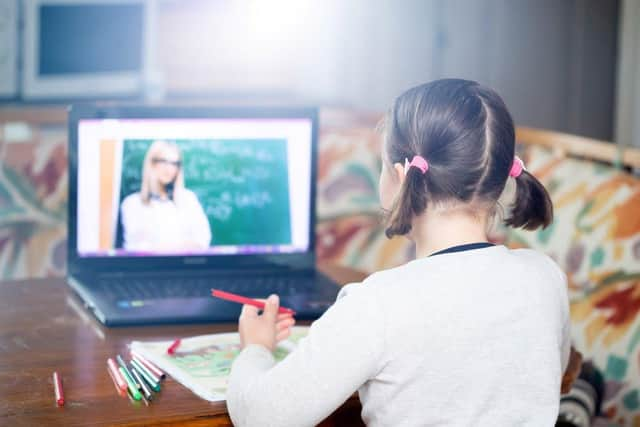The impact of home schooling on Falkirk's pupils and parents
This article contains affiliate links. We may earn a small commission on items purchased through this article, but that does not affect our editorial judgement.
and live on Freeview channel 276
The disruption the current COVID-19 restrictions are causing to pupils’ learning and education, which teachers are doing everything they can to keep to a minimum, and the knock on effect it has on parents, who are now forced to juggle work with childcare and home schooling commitments is enough to cause stress levels to rise in even the strongest family unit.
In light of this, health specialists at GolfSupport.com sought to learn more about the impact homeschooling might have on the mental health of adults and children.
Advertisement
Hide AdAdvertisement
Hide AdIt can leave many parents and children feeling overwhelmed and anxious with people admitting homeschooling is “pushing them to their limit” and, at times, makes them feel like they are “losing their mind”.


GolfSupport.com enlisted the expertise and experience of psychologist and well being consultant Lee Chambers to find out just what long-term effects this current situation could have.
Mr Chambers said: “Being at home while educating, working, relaxing and sleeping, can become overwhelming, and the loss of a socially defined schedule creates a lack of stability.
“And there is increasing pressure to home school effectively. As parents we want the best for our children and we feel guilty if we are unable to give them our undivided attention and worry it may impact their future performance.
Advertisement
Hide AdAdvertisement
Hide Ad“Children will miss out on the social connection and structure of school, and while elements can be replicated, there are certain struggles around the technology, being connected, and learning culture in some households.


“While some children may thrive in a home environment, others will find it difficult to adapt. Overall, many parents are more likely to feel stressed, worried, isolated, and subject to domestic conflict.
“This will likely have an adverse long-term impact on mental health and perhaps widen the inequality gap.”
There are a number of important signs to look out for when it comes to ascertaining if your child is suffering from stress.
Advertisement
Hide AdAdvertisement
Hide AdMr Chambers said: “Increasing aggression can manifest both physically and verbally, and often comes with struggling to be patient with challenging tasks. Children may also become withdrawn because homeschooling can be an isolating experience.


“It’s important to recognise if your child appears to be withdrawing from social contact in general and if they are overreacting to even small issues. Children can feel pressure to perform, and this can generate anxiety that leads to outbursts over small challenges or problems.
“If your child is having nightmares this is another sign of stress. Fear is a typical response to heightened levels of stress, and this can present itself in the form of sleep issues.
“When a child has a mind full of thoughts and feels a lack of stability, it is much easier for them to miss their toilet cues and may result in them wetting the bed. It can also lead to a change in their eating habits.
Advertisement
Hide AdAdvertisement
Hide Ad“A lack of attention or focus is to be expected given the uncertainty and constant change, but if it is impacting completing tasks it may be a sign of stress.”


The amount of time children are now spending on their laptops for both school work and leisure can also lead to a rise in stress levels.
“Increased screen time has an impact on our stress levels and our ability to handle stress,” said Mr Chambers. “Increased screen time affects our melatonin production, which can cause sleep quantity and quality issues. This can impact our hormonal and emotional regulation, impacting our ability to handle stressors the following day.
“It can also elevate our cortisol levels, making us feel more stressed and again impacting our sleep. It can also cause eye strain, which results in fatigue and makes it more challenging to handle stressful situations.
Advertisement
Hide AdAdvertisement
Hide Ad“Screen time also impacts GABA – or Gamma-Aminobutyric acid – production, and children who have increased screen time have decreased GABA production, impacting their mood, stress levels and sleep.”
There are a number of simple things which parents can do to cope with the stress of homeschooling.
Mr Chambers said: “It is important to set boundaries and create a schedule that can become a routine that everyone can resonate with. By setting boundaries, expectations can be managed, and you can make some space for your own self-care.
“A schedule gives structure and purpose to your day, making you feel more in control and more certain about what you have planned. By communicating boundaries, everyone understands what will happen, and there is less likely to be conflict.
Advertisement
Hide AdAdvertisement
Hide Ad“Finding ways to relax in the evening where possible is paramount, so you can get a good night's sleep, which will recharge you and give you the emotional balance to tackle another challenging day.
“Eating well is also essential as 90 per cent of our serotonin, our happy hormone, is produced in our gut. It is also important to be kind to ourselves. Keep it simple and fun, and expect that things will go wrong, and prepare to laugh when they do.
“Parents should try to manage their own emotions, as it is not easy with so much turbulence. If you feel like you need a minute, step away and take time to breathe, to be silent or just to close your eyes.
“Parents and children should consider writing their thoughts and feelings down, as transitioning them onto paper is powerful. It helps us to be more self-aware, and that is an effective way to manage our stress.”
Visit www.golfsupport.com for more information.
Comment Guidelines
National World encourages reader discussion on our stories. User feedback, insights and back-and-forth exchanges add a rich layer of context to reporting. Please review our Community Guidelines before commenting.